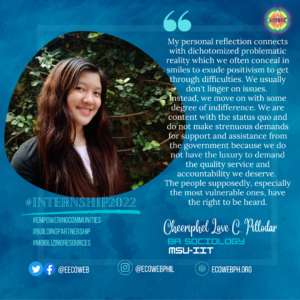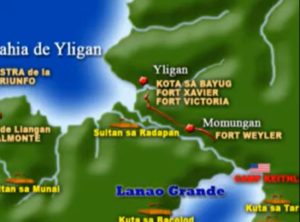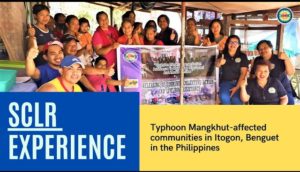by Grazel Joy Angot Potutan
Seriously, I was unaware of and have not explored any non-governmental organization or of any organization with social and humanitarian goals.
I am only familiar with local government units, which provide emergency reliefs, monetary assistance, and undertake community initiatives.
This internship made me discover and appreciate ECOWEB Inc. whose people serve based on principles and frameworks to better the lives of its community partners and cause ripple effects to its indirect beneficiaries and networks for strategic gains. There is also apparent opportunities to strengthen socialization, interaction, and integration for them to comprehend the social structure in which they live. I understand that everyone has needs, but the humanitarian services highlighted the priority inclusion of those most vulnerable and those that are severely disadvantaged from access of social services.
For me, the sclr approach is truly a work of art in terms of empowering communities– helping people help themselves and causing development. It does not merely help the community by providing its material needs, but it capacitates them to be more resilient. However, more time should be permitted for the community to decide and plan so as not to diminish its participation and empowerment while in rapid needs assessment and participatory action. I consigned that it is preferable to still monitor the community during and after its implementation in order to evaluate their internal growth. Having everyone work toward equality without anyone feeling less is a demonstration of strength in the circular structure under the sclr approach.
The institution ensures that all efforts to help is valuable because they’re addressing the most important problems and have figured out who should be helped first out of all the people who needed help.
I’d like to draw attention to how poverty influences in defining our society and the need to reduce it. It’s both the reason why people are in their current living conditions and the result of factors that negatively impacted on their lives. Poverty is a major issue confronting communities we have visited and interviewed. Unemployment and unstable incomes are the major contributors to their plight. What a sad turn of fate that poverty is still a cause and the root of the problem today! It’s a societal problem that calls for the rediscovery of the root causes of their disadvantages, including their marginalization in politics and economics. Yes, I’d rather hear good news than bad, but what is the underlying problem here? The inability to solve poverty left communities continuously at risk from both natural and man-made disasters or exposed to hazards of all kinds.
The 35 days of on-the-job training and observing the job of the ECOWEB employees have shown that contributing to society’s stability isn’t easy and that doing so can be exhausting due to the complexity of social and economic factors. However, being part of human resources and working for development can be a source of strength and inspiration, too.
ECOWEB’s initiatives serve as a driving force for others to see the world around them and what they could do to be more helpful in this uncertain world. For me, the experience of hearing other people’s stories and seeing your jobs made me cringe at what I have significantly done and contributed to society in my 21 years of existence. I learned how to be involved with the community to contribute improve their living conditions.
Since we live on the same ground, I think it’s important to feel for each other for the greater good. Knowing that any kind of support, no matter how small, should be valued and serve as a step toward a better life. I’m looking forward to the opportunity to interact with and learn from our own indigenous communities and other oppressed groups who are just as disadvantaged and underserved.
My 35-day internship was a roller coaster ride which ended successfully. Regardless of my fate, I also want to be of help to society. I’m baring myself to effectively work on it and be more confident that I can also make a difference. It opened my eyes on the importance of our individual roles in promoting social change.
I would like to express my sincere appreciation to ECOWEB Inc., for accepting us as interns. Thank you also to the employees for being kind, accommodating, and responsive despite the fact that everyone seems to be always working in a hurry, just as their beneficiaries were obliged to be in an unrealistically time-bound process, which makes some processes improper and may affect empowerment. But I salute them for being efficient in addressing community concerns.
Involving ourselves in humanitarian project was highly rewarding. Although we overthought most of the time if we satisfied them with the services and with our behavior, we are really grateful for all their patience, accommodation, understanding, and efforts. Our experiences with them were all undeniably helpful. Hopefully, we were able to reciprocate that.
Indeed, we are grateful that we completed our OJT here in order to be thoroughly immersed and trained. This is really one of the most unforgettable moments of my life when I indulged in exposing and learning from socially-related activities and experiences.
I saw and felt that all of the staff in ECOWEB, regardless of their specialization, put their all to effectively fulfill their commitment to serve the communities. I can feel their stress, but I can also see how survivor-like they are and how exhausted but tough they can be in the face of adversity. They are true role models for me.
As interns, we are grateful for everything despite the sleepless nights, pressures, and multi-tasking. Thank you for the learning experience and realization you have provided for us.
May you continue the positive service and influence. Together, its possible to achieve a better world.
(Grazel Joy is a BA Sociology student of Mindanao State University-Iligan Institute of Technology (MSU-IIT) who completed her 35-day internship program in ECOWEB Inc. She is one of the four interns who conducted community profiling, virtual monitoring of project beneficiaries, assisted the learning review of humanitarian intervention for vulnerable and conflict-affected communities, and produced documentations.)




